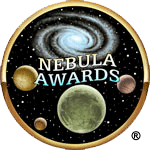 Science Fiction and Fantasy Writers of America is proud to announce the nominees for the 2011 Nebula Awards (presented 2012), the nominees for the Ray Bradbury Award for Outstanding Dramatic Presentation, and the nominees for the Andre Norton Award for Young Adult Science Fiction and Fantasy Book.
Science Fiction and Fantasy Writers of America is proud to announce the nominees for the 2011 Nebula Awards (presented 2012), the nominees for the Ray Bradbury Award for Outstanding Dramatic Presentation, and the nominees for the Andre Norton Award for Young Adult Science Fiction and Fantasy Book.
Novel
- Among Others, Jo Walton (Tor)
- Embassytown, China Miéville (Macmillan UK; Del Rey; Subterranean Press)
- Firebird, Jack McDevitt (Ace Books)
- God’s War, Kameron Hurley (Night Shade Books)
- Mechanique: A Tale of the Circus Tresaulti, Genevieve Valentine (Prime Books)
- The Kingdom of Gods, N.K. Jemisin (Orbit US; Orbit UK)
Novella
- “Kiss Me Twice,” Mary Robinette Kowal (Asimov’s Science Fiction, June 2011)
- “Silently and Very Fast,” Catherynne M. Valente (WFSA Press; Clarkesworld Magazine, October 2011)
- “The Ice Owl,” Carolyn Ives Gilman (The Magazine of Fantasy and Science Fiction, November/December 2011)
- “The Man Who Bridged the Mist,” Kij Johnson (Asimov’s Science Fiction, October/November 2011)
- “The Man Who Ended History: A Documentary,” Ken Liu (Panverse Three, Panverse Publishing)
- “With Unclean Hands,” Adam-Troy Castro (Analog Science Fiction and Fact, November 2011)
Novelette
- “Fields of Gold,” Rachel Swirsky (Eclipse 4, Night Shade Books)
- “Ray of Light,” Brad R. Torgersen (Analog Science Fiction and Fact, December 2011)
- “Sauerkraut Station,” Ferrett Steinmetz (Giganotosaurus, November 2011)
- “Six Months, Three Days,” Charlie Jane Anders (Tor.com, June 2011)
- “The Migratory Pattern of Dancers,” Katherine Sparrow (Giganotosaurus, July 2011)
- “The Old Equations,” Jake Kerr (Lightspeed Magazine, July 2011)
- “What We Found,” Geoff Ryman (The Magazine of Fantasy and Science Fiction, September/October 2011)
Short Story
- “Her Husband’s Hands,” Adam-Troy Castro (Lightspeed Magazine, October 2011)
- “Mama, We are Zhenya, Your Son,” Tom Crosshill (Lightspeed Magazine, April 2011)
- “Movement,” Nancy Fulda (Asimov’s Science Fiction, March 2011)
- “Shipbirth,” Aliette de Bodard (Asimov’s Science Fiction, February 2011)
- “The Axiom of Choice,” David W. Goldman (New Haven Review, Winter 2011)
- “The Cartographer Wasps and the Anarchist Bees,” E. Lily Yu (Clarkesworld Magazine, April 2011)
- “The Paper Menagerie,” Ken Liu (The Magazine of Fantasy and Science Fiction, March/April 2011)
Ray Bradbury Award for Outstanding Dramatic Presentation
- Attack the Block, Joe Cornish (writer/director) (Optimum Releasing; Screen Gems)
- Captain America: The First Avenger, Christopher Markus, Stephen McFeely (writers), Joe Johnston (director) (Paramount)
- Doctor Who: “The Doctor’s Wife,” Neil Gaiman (writer), Richard Clark (director) (BBC Wales)
- Hugo, John Logan (writer), Martin Scorsese (director) (Paramount)
- Midnight in Paris, Woody Allen (writer/director) (Sony)
- Source Code, Ben Ripley (writer), Duncan Jones (director) (Summit)
- The Adjustment Bureau, George Nolfi (writer/director) (Universal)
Andre Norton Award for Young Adult Science Fiction and Fantasy Book
- Akata Witch, Nnedi Okorafor (Viking Juvenile)
- Chime, Franny Billingsley (Dial Books; Bloomsbury)
- Daughter of Smoke and Bone, Laini Taylor (Little, Brown Books for Young Readers; Hodder & Stoughton)
- Everybody Sees the Ants, A.S. King (Little, Brown Books for Young Readers)
- The Boy at the End of the World, Greg van Eekhout (Bloomsbury Children’s Books)
- The Freedom Maze, Delia Sherman (Big Mouth House)
- The Girl of Fire and Thorns, Rae Carson (Greenwillow Books)
- Ultraviolet, R.J. Anderson (Orchard Books; Carolrhoda Lab)
The winners will be announced at SFWA’s 47th Annual Nebula Awards Weekend, to be held Thursday through Sunday, May 17 to May 20, 2012 at the Hyatt Regency Crystal City in Arlington, Virginia, near Reagan National Airport. As announced earlier this year, Connie Willis will be the recipient of the 2011 Damon Knight Grand Master Award for her lifetime contributions and achievements in the field. Walter Jon Williams will preside as toastmaster, with Astronaut Michael Fincke as keynote speaker.
The Nebula Awards are voted on, and presented by, active members of SFWA. Voting will open to SFWA Active members on March 1 and close on March 30. More information on voting is available here.
Founded in 1965 by the late Damon Knight, Science Fiction and Fantasy Writers of America brings together the most successful and daring writers of speculative fiction throughout the world.
Since its inception, SFWA® has grown in numbers and influence until it is now widely recognized as one of the most effective non-profit writers’ organizations in existence, boasting a membership of approximately 2,000 science fiction and fantasy writers as well as artists, editors and allied professionals. Each year the organization presents the prestigious Nebula Awards® for the year’s best literary and dramatic works of speculative fiction.